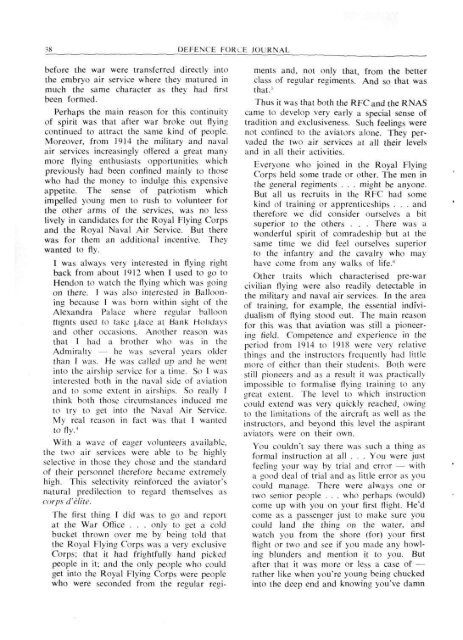ISSUE 3 : Mar/Apr - 1977 - Australian Defence Force Journal
ISSUE 3 : Mar/Apr - 1977 - Australian Defence Force Journal
ISSUE 3 : Mar/Apr - 1977 - Australian Defence Force Journal
Create successful ePaper yourself
Turn your PDF publications into a flip-book with our unique Google optimized e-Paper software.
38 DEFENCE FORCE JOURNALbefore the war were transferred directly intothe embryo air service where they matured inmuch the same character as they had firstbeen formed.Perhaps the main reason for this continuityof spirit was that after war broke out flyingcontinued to attract the same kind of people.Moreover, from 1914 the military and navalair services increasingly offered a great manymore flying enthusiasts opportunities whichpreviously had been confined mainly to thosewho had the money to indulge this expensiveappetite. The sense of patriotism whichimpelled young men to rush to volunteer forthe other arms of the services, was no lesslively in candidates for the Royal Flying Corpsand the Royal Naval Air Service. But therewas for them an additional incentive. Theywanted to fly.I was always very interested in flying rightback from about 1912 when I used to go toHendon to watch the flying which was goingon there. 1 was also interested in Ballooningbecause I was born within sight of theAlexandra Palace where regular balloontlignts used to take place at Bank Holidaysand other occasions. Another reason wasthat I had a brother who was in theAdmiralty — he was several years olderthan 1 was. He was called ur> and he wentinto the airship service for a time. So I wasinterested both in the naval side of aviationand to some extent in airships. So really 1think both those circumstances induced meto try to get into the Naval Air Service.My real reason in fact was that I wantedto fly.'With a wave of eager volunteers available,the two air services were able to be highlyselective in those they chose and the standardof their personnel therefore became extremelyhigh. This selectivity reinforced the aviator'snatural predilection to regard themselves ascorps d'clite.The first thing 1 did was to go and reportat the War Office . . . only to get a coldbucket thrown over me by being told thatthe Royal Flying Corps was a very exclusiveCorps; that it had frightfully hand pickedpeople in it; and the only people who couldget into the Royal Flying Corps were peoplewho were seconded from the resular regimentsand, not only that, from the betterclass of regular regiments. And so that wasthat."'Thus it was that both the RFC and the RNAScame to develop very early a special sense oftradition and exclusiveness. Such feelings werenot confined to the aviators alone. They pervadedthe two air services at all their levelsand in all their activities.Everyone who joined in the Royal FlyingCorps held some trade or other. The men inthe general regiments . . . might be anyone.But all us recruits in the RFC had somekind of training or apprenticeships . . . andtherefore we did consider ourselves a bitsuperior to the others . . . There was awonderful spirit of comradeship but at thesame time we did feel ourselves superiorto the infantry and the cavalry who mayhave come from any walks of life."Other traits which characterised pre-warcivilian flying were also readily detectable inthe military and naval air services. In the areaof training, for example, the essential individualismof flying stood out. The main reasonfor this was that aviation was still a pioneeringfield. Competence and experience in theperiod from 1914 to 1918 were very relativethings and the instructors frequently had littlemore of either than their students. Both werestill pioneers and as a result it was practicalUimpossible to formalise flying training to anygreat extent. The level to which instructioncould extend was very quickly reached, owingto the limitations of the aircraft as well as theinstructors, and beyond this level the aspirantaviators were on their own.You couldn't say there was such a thing asformal instruction at all . . . You were justfeeling your way by trial and error — witha good deal of trial and as little error as youcould manage. There were always one ortwo senior people . . . who perhaps (would)come up with you on your first flight. He'dcome as a passenger just to make sure youcould land the thing on the water, andwatch you from the shore (for) your firstflight or two and see if you made any howlingblunders and mention it to you. Butafter that it was more or less a case of —rather like when you're young being chuckedinto the deep end and knowing you've damn
















